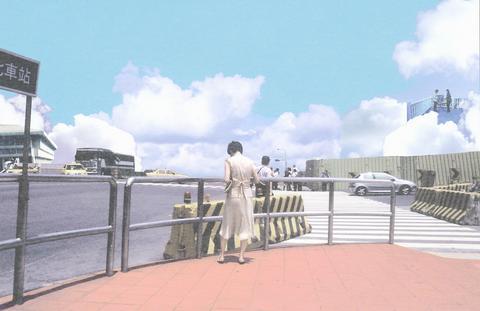The skywalk is gone; How can my two actors encounters each other? seems to be the question being asked by director Tsai Ming-liang (蔡明亮) in the sentimental short film, The Skywalk is Gone (天橋不見了), which will be screening at Taipei's Cinemark cinema at the Living Mall (京華城喜滿客) today.
This is the first time that a 22-minute short is having an independent cinema release.
For the director's many fans, the language of Tsai's films continues lucid and rich in this short work, even though Taipei remains a cheerless place and his characters rarely have a chance of happiness. He does not, however, cater so well for those coming to his work for the first time.

PHOTO COURTESY OF TSAI MING-LIANG
In fact, Skywalk is really an extension of What Time is it There? (
In What Time is it There? the female protagonist, Hsiang-chi (
She hangs around Taipei Railway Station and the Mitsukoshi Department store, walking aimlessly. She comes across a woman who drags a huge suitcase. Hsiang-chi follows her. Then both are stopped by a policeman for jay walking. The woman argues that she wanted to take the skywalk, but it is no longer there.
And Hsiang-chi continues searching for Hsiao-kang, but can find no trace of him.
For director Tsai, Taipei is a rapidly changing city. Every 10 years, old memories are wiped away and places acquire a new look. Perhaps it is not too much of a coincidence that each of Tsai's films have landmarks that have since disappeared.
"It seems that many places that I shot for my films have vanished. This is kind of worrying!" said Tsai jokingly.
It's self-referential natures makes Skywalk somewhat difficult to understand, but Tsai maintains high production values and the short film is filled with precise shots, beautiful photography and good performances.

Taiwan has next to no political engagement in Myanmar, either with the ruling military junta nor the dozens of armed groups who’ve in the last five years taken over around two-thirds of the nation’s territory in a sprawling, patchwork civil war. But early last month, the leader of one relatively minor Burmese revolutionary faction, General Nerdah Bomya, who is also an alleged war criminal, made a low key visit to Taipei, where he met with a member of President William Lai’s (賴清德) staff, a retired Taiwanese military official and several academics. “I feel like Taiwan is a good example of

March 2 to March 8 Gunfire rang out along the shore of the frontline island of Lieyu (烈嶼) on a foggy afternoon on March 7, 1987. By the time it was over, about 20 unarmed Vietnamese refugees — men, women, elderly and children — were dead. They were hastily buried, followed by decades of silence. Months later, opposition politicians and journalists tried to uncover what had happened, but conflicting accounts only deepened the confusion. One version suggested that government troops had mistakenly killed their own operatives attempting to return home from Vietnam. The military maintained that the

Before the last section of the round-the-island railway was electrified, one old blue train still chugged back and forth between Pingtung County’s Fangliao (枋寮) and Taitung (台東) stations once a day. It was so slow, was so hot (it had no air conditioning) and covered such a short distance, that the low fare still failed to attract many riders. This relic of the past was finally retired when the South Link Line was fully electrified on Dec. 23, 2020. A wave of nostalgia surrounded the termination of the Ordinary Train service, as these train carriages had been in use for decades

Lori Sepich smoked for years and sometimes skipped taking her blood pressure medicine. But she never thought she’d have a heart attack. The possibility “just wasn’t registering with me,” said the 64-year-old from Memphis, Tennessee, who suffered two of them 13 years apart. She’s far from alone. More than 60 million women in the US live with cardiovascular disease, which includes heart disease as well as stroke, heart failure and atrial fibrillation. And despite the myth that heart attacks mostly strike men, women are vulnerable too. Overall in the US, 1 in 5 women dies of cardiovascular disease each year, 37,000 of them